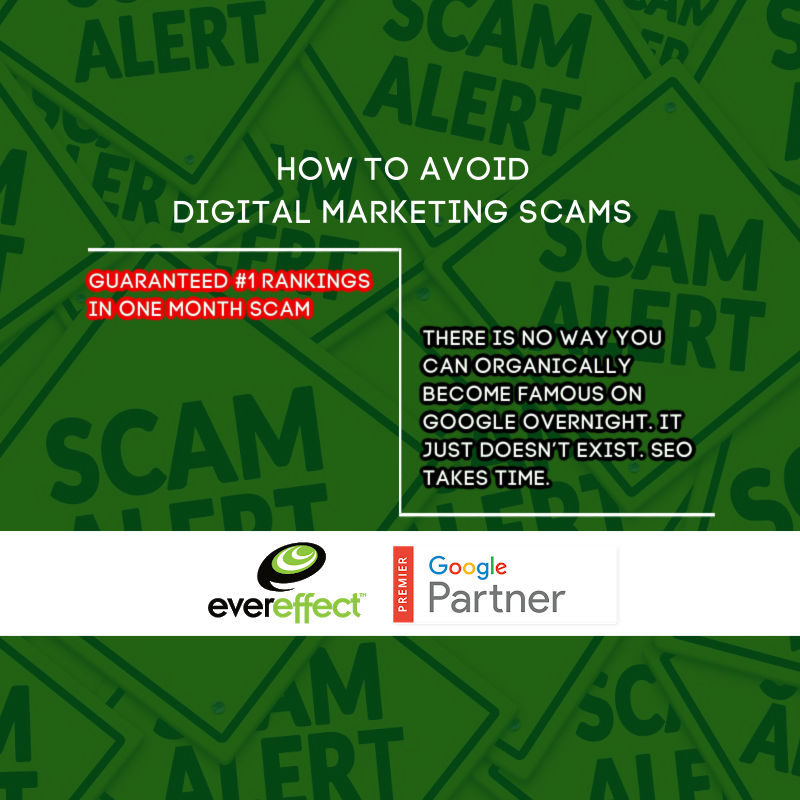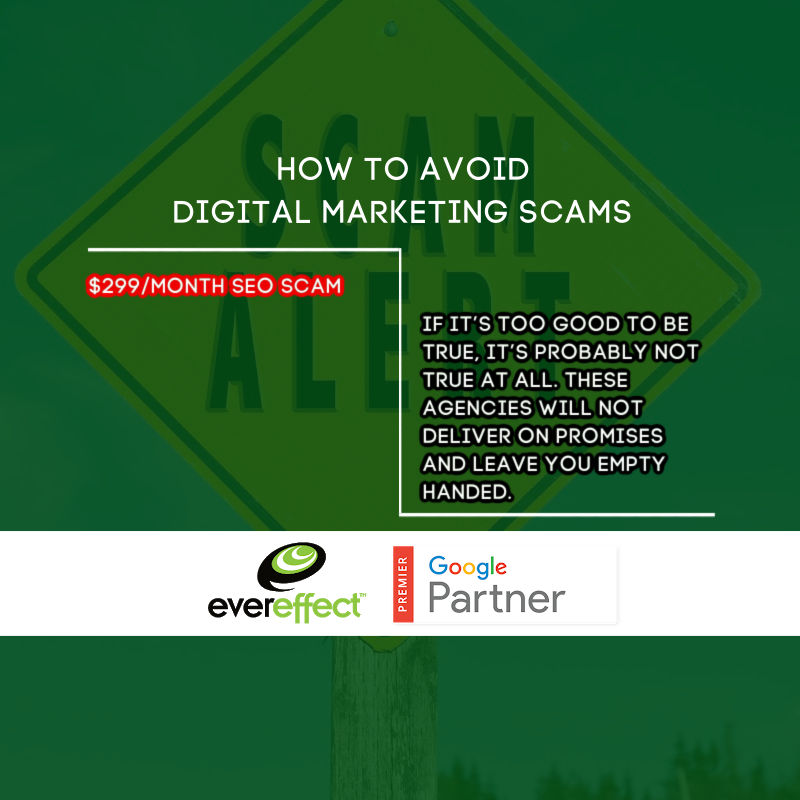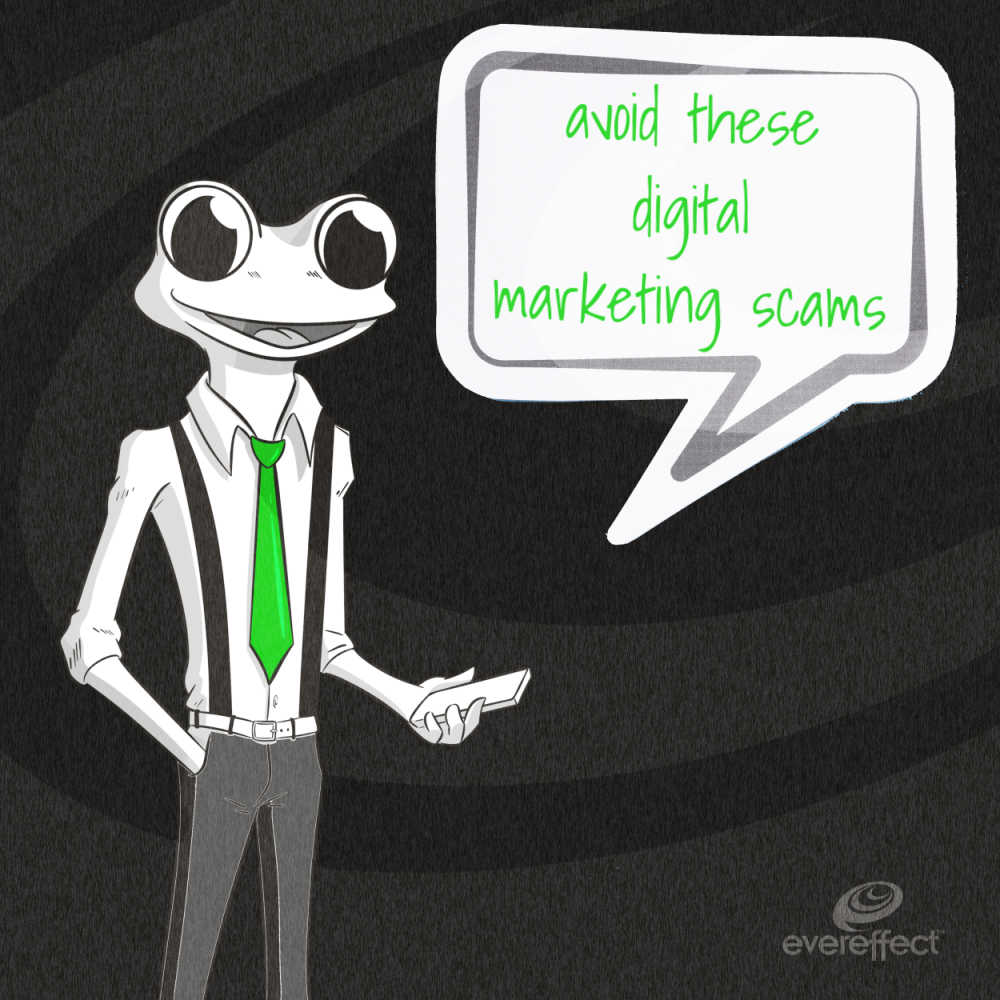Avoid These Digital Marketing Scams
As a growing business, you have a lot on your plate. You’re taking care of internal business processes, such as payroll, client communications, and team management, while also trying to give yourself an advantage on the web. At some point, you have to reach out for help to take a step forward. You begin outsourcing some of your digital marketing work because you no longer have time to focus on the nitty-gritty details of being found online.
That sounds like a good idea, right? It can be, but it can also be a devastating one if you don’t know where to look. There are so many different marketing scams out there — some online, others offline — that can prove fatal to your business’ reputation and operations.
The question is, how do you know which offers are scams and which ones are legitimate?
The Digital Marketing agency experts at EverEffect are here to help. Next time you get an email offering to put your website at the top of Google’s search results page, you’ll know whether it’s the real deal or a scam. In this post, we’ll cover five different marketing scams you should avoid and some tips you can use to verify whether or not you are being scammed.
But first, let’s start with an overview of digital marketing and why you need it to grow your business.
Digital Marketing: It’s More Important Now Than Ever Before
Did you know that there are 5.6 billion Google searches a day? That means approximately 3.8 Google searches an hour, and that number is steadily growing.
We use Google for everything, from where we’re going to eat dinner to what dog food we should buy. As a result, digital marketing is mostly Google-based, meaning that it optimizes your site for Google specifically. Why does this matter?
It comes down to Search Engine Optimization Services and PPC Management Services. When your website has been optimized for Google or has a pay-per-click campaign, it is more likely to appear at the top of Google’s Search Engine Result Page (SERP). Most people don’t look below the first three or four search results on Google, so you want to make sure that your website is near the top.
So what do you do? You hire a digital marketing agency you can trust. It may take time to get your business established on Google, but when it does, you’ll start seeing excellent results and exponential growth.
If you’re looking to hire an agency and they are telling you that you’ll have guaranteed results by a specific time, you want to be wary. It’s difficult to put an exact time on when your results will be delivered with digital marketing. This agency may be trying to scam you. With that in mind, let’s dive into the five marketing scams you need to avoid while hiring a digital marketing agency.

The Five Top Marketing Scams
#1: The “Buy Followers” Scam
You may come across agencies that claim that they can easily triple your number of social media followers. While this sounds tempting, the only followers you’ll receive will be fake. They won’t care about your company or service. Some of them may not even be real.
Instead, you need followers that are actually invested in your company. These followers want to buy your service and product and sing your praises.
Don’t invest in fake friends. They’ll only let you down. Instead, seek advice from a digital marketer who can help you build your social media presence by targeting your ideal customer. By steadily increasing your engagement rate, more of your ideal customers will find your business and be willing to invest for the long haul.
#2: The “Speedy SEO” Scam
SEO takes time. There is really no way you can organically become famous on Google overnight. It just doesn’t exist. When you decide to optimize your website for Google’s search engine, it takes months, even years, to see a big difference.
If a digital marketing company claims that they can put you as #1 on Google’s search page, don’t trust them. Chances are, they will use some illegal and scammy tactics to make that happen, which will result in your website being blacklisted by Google. As a growing business, that is the last place where you want to be.
Instead, work with digital marketers who use approved SEO methods, otherwise known as “white hat SEO tactics.” These tactics are completely legal and will help grow your site’s authority over time.
Perhaps the most efficient way to increase SEO is by creating content on your site based on trending keywords that relate to your business. A legitimate digital marketing agency can help you do just that.
#3: The Outsourcing Bad Content Scam
If you decide to hire a digital marketing agency to help you with content marketing, make sure that you compare their prices with other well-established marketing firms. If their prices are significantly lower, this doesn’t mean that they’re giving you a good deal.
In fact, it may mean that they are hiring offshore copywriters who don’t speak native English. To be clear — there is nothing wrong with outsourcing copywriting, but to ensure quality. We suggest asking for writing examples.
#4: The Cheap Website Scam
These days, every business needs a website. If you don’t have a website yet, that should be one of your top priorities to gain traction with your business. However, don’t trust low website-building prices.
A website is an investment, especially if you want a custom made one. If someone offers to create a website for you and the price is unbelievable, chances are that the website will be poorly designed and may even be a duplicate of another website. If that’s the case, you may get blacklisted by Google for unoriginal content.
#5: “The Price Is a Steal” Scam
Once you receive a quote from the digital marketing agency, if it’s too good to be true, it’s probably not true at all.
Get clear on what the market value is for digital marketing strategy services that you require. And if your quote falls steeply below that, they most likely will not deliver what they’re promising. You’ll be left empty-handed with little to nothing to show for your website.
At the same time, if a marketing firm is charging outrageous prices, it’s good to steer clear of them too.

#6: Business Directory Scams
This scam typically involves a company promising to list your business in a major online directory or multiple directories. The scammer may even claim that these directories will significantly boost your visibility and SEO rankings, often guaranteeing a specific number of leads or sales.
Of course, once you’ve paid for the service, the promised results rarely materialize. Your business will be listed on obscure, low-traffic websites that have no impact on your SEO. These scammers often use high-pressure sales tactics and misleading billing to trick businesses into paying for recurring directory listing services that they don’t need or want.
The key to avoiding these scams is to do your due diligence. Before paying for any directory listing.
#7: Lead Generation Fraud
This involves generating fake or manipulated leads to profit from unsuspecting businesses. This scam can take various forms, including creating fake leads, manipulating legitimate leads, or generating invalid leads through fraudulent means. The consequences of lead generation fraud are significant, leading to wasted resources, false expectations, financial loss, and potential harm to consumers.
Businesses are adversely affected by lead generation fraud as they invest time and resources into non-existent or unqualified leads. This can result in a waste of valuable resources and damage their reputation if they unknowingly engage with fraudulent lead generation providers. Financial loss occurs when businesses pay for leads with no potential for conversion. Consumers may suffer as their personal information can be misused or sold without their consent, leading to unwanted marketing communications and potential scams targeting their data.
#8: Social Media Click Farms
Social media click farms are often located in developing countries, and employ a large number of people to click on content, inflate social media followers, or generate false engagement. They essentially offer a shortcut to popularity by artificially inflating a brand’s online presence.
This practice is deceptive and violates the terms of service of most social media platforms. While it might seem appealing to quickly boost your numbers, the “engagement” you’re getting from click farms is empty. The clicks, likes, and follows come from fake accounts or individuals who have no interest in your product or service. They won’t interact with your content in a meaningful way or become genuine customers.
Using click farms can harm your reputation and even result in penalties. Many social media platforms use sophisticated algorithms to detect fraudulent activity. If they catch you using a click farm, they might suspend your account or decrease your visibility in users’ feeds. Moreover, if your real followers find out that you’ve artificially inflated your numbers, it could damage your credibility and trustworthiness.
#9: Falsified Back Catalog
This involves presenting fake client portfolios or exaggerated success stories. Falsified back catalogs often include fabricated metrics and misleading clients with false performance indicators. Fabricating a history of successful projects or client work misleads potential clients and creates unrealistic expectations. This can result in disappointment, wasted resources, and a loss of trust in the industry as a whole.
Ethical concerns also arise when businesses present a falsified back catalog. This practice goes against the principles of transparency, honesty, and integrity that should be upheld in the digital marketing industry. Clients deserve accurate information about a company’s capabilities and past performance to make informed decisions. Moreover, there can be legal implications if clients discover they have been misled and can prove damages as a result. Falsifying a back catalog can lead to lawsuits and damage the reputation of the company involved.
Five Tips to Avoid Getting Scammed in Digital Marketing
Now that we’ve discussed some of the top digital marketing scams out there, here are some tips to help you avoid them entirely.
Tip #1: Respectfully Ask for References and Follow Up on Them
Before you hire a digital marketing firm, kindly ask that they supply references from other clients and give you ways to contact those clients. If you’re working with a specific person on the digital marketing team closely, you can also ask for their references.
Scamming companies may still give you “references”; however, you’ll discover that they aren’t real if you follow up on those references. Most people don’t ask for references, so scammy companies take advantage of this.
Before talking to the references, write down some important questions to ask them. Questions like…
- What was your opinion of X’s work? Did they go above and beyond your expectations?
- Did you experience any conflict while working with X? And if so, was that conflict resolved?
- How well did the digital marketing firm communicate with you? Did they keep you involved in the process? Did they genuinely listen to your questions and concerns?
If the reference gives positive feedback, other than a simple “yes” or “no,” then you’re likely not being scammed. Still, you can never be too careful. When possible, talk to several references and not just one.
Tip #2: Ask for Regular Reports
If it’s your first time launching a website or investing in SEO, you’ll probably have a lot of questions. That’s okay. In fact, you should have questions. Don’t be afraid to pose those questions to the digital marketing agency you’re considering.
Often, you’ll be working with a digital marketing agency for an extended period of time, so you want a business relationship that is full of trust. If there’s a problem, you want them to tell you, and vice versa. If the agency doesn’t answer your question or doesn’t get back to you timely, you may be being scammed.
We recommend that you ask your digital marketing agency to send you regular weekly reports on the work that they’re doing. When they send the first report, ask questions if you’re unclear about anything. Even though SEO is a long game, you want to see weekly reports of what they are doing and how it’s affecting your SEO, even if it’s a small amount.
Tip #3: Research, Research, Research!
Before hiring a digital marketing agency, do your homework.
- Do they have a custom website?
- Is their content informative and well-written?
- Are they using good SEO practices on their own site?
- Google search their name – do you see paid ads or organic search results?
- Is the agency highlighted in any official publications or reviews?
Don’t take their word for it that they’re the best — give yourself the upper hand by researching prior to contacting them. With a few quick google searches, you can get a good idea of whether the firm is well-established or scammy.
#4: Use LinkedIn to Verify Work History
If you’re looking to hire a new firm that doesn’t have many references, you can always research the work history of that firm’s individual team members via LinkedIn. New doesn’t mean bad; it just means that you may have to do some extra research to ensure that the firm is capable of handling your project.
#5: Trust Your Intuition
If you ever feel like you’re being scammed, you probably are. Before committing to working with a firm, make sure that you have an “emergency exit strategy” in place in case things get dicey. You can do this in your contract agreement, saying that if any of the following things were to occur (such as overspending, missed deadlines, or failed communication), you have the right to terminate your contract.
Trust us — this isn’t being rude; it’s being safe. You do not deserve to waste time and money on a scammy marketing agency.
Trust EverEffect for Your Digital Marketing Needs
Scams aren’t a rare occurrence — they happen every day. You most likely know someone who’s been a victim of a marketing scam, and perhaps you already have.
But if that’s the case, you don’t have to be anymore. As long as you keep these scams and tips in mind, you are much less likely to fall prey to a digital marketing scam. By doing so, you’ll be prepared to make the best decisions for your business growth in the long term.
Here at EverEffect, we want to help you achieve your business goals. We’re focused on your ROI from day one, using our SEO, PPC, video, content, and email services to boost your authority and build your brand presence. We’re also a Google Partner, meaning that we’ve been recognized by Google to deliver superior results in digital marketing.
We are a team that wants you involved. We give weekly reports on progress and value collaboration and transparency as essential parts of business success and partnership.


2 comments on “Avoid These Digital Marketing Scams”
Excellent post. I’m going through some of these issues as well..
Thanks Jim. There are some good and honest digital agencies out there still 🙂